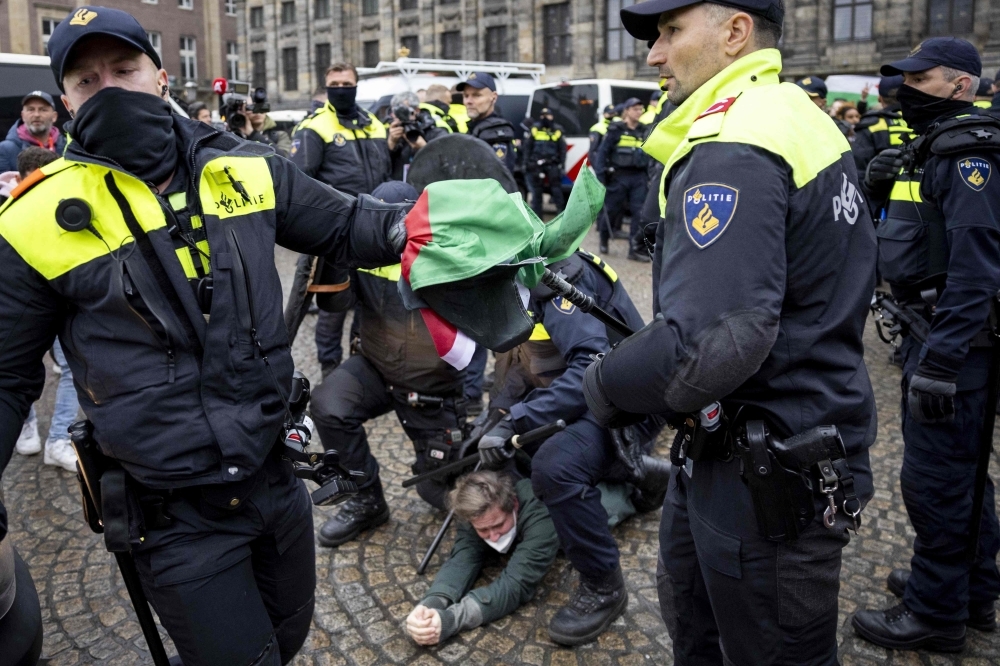
What sparked the violence in Amsterdam during Ajax-Maccabi match, and why Dutch fans aren’t entirely to blame

Police officers clash with protestors during a demonstration on Dam Square on November 10 following tensions and violence surrounding supporters of Israeli soccer club Maccabi Tel Aviv. — AFP pic
Thursday, 14 Nov 2024 1:05 PM MYT
AMSTERDAM, Nov 14 — Violence erupted in Amsterdam surrounding a Europa League football match between Ajax and Israel’s Maccabi Tel Aviv last Friday, triggering global concern.
The Guardian reported that while the violence involved clashes between rival groups, authorities have clarified that the conflict was inflamed by actions from Israeli fans, not solely the Dutch supporters.
Amsterdam’s mayor, Femke Halsema, pointed out on Tuesday that the match had not been flagged as a high-risk event despite the warnings that led Turkish club Beşiktaş to move their match against Maccabi to a neutral venue, citing concerns over “provocative actions,” as reported by The Guardian.
Initial findings now indicate that the violence was a result of “a toxic cocktail of antisemitism, hooliganism, and anger over the war in Palestine and Israel,” according to the news report.
Tensions began building on last Wednesday, the day before the match. Maccabi fans were reported to have torn down a Palestinian flag from a building and set it on fire, while chanting inflammatory slogans targeted at Palestine and damaging a taxi.
These actions, compounded by the presence of large groups of Israeli fans in the city, sparked a volatile atmosphere. The Guardian highlighted that social media footage also revealed Maccabi supporters chanting derogatory anti-Arab remarks in Hebrew and celebrating violent rhetoric.
With Amsterdam’s sizable Muslim community already engaged in pro-Palestine protests, tensions were clearly high.
The violence reached its peak after the match, with Ajax emerging victorious 5-0.
Maccabi fans were subjected to several “hit and run” attacks across the city, with masked youths on scooters and ebikes targeting individuals wearing Maccabi colours.
Police reports also detailed assaults where victims were asked if they were Jewish. False reports that Maccabi supporters had been kidnapped further fueled the chaos, which continued into the early hours of the morning.
In another disturbing development, footage showed Maccabi supporters near the Amsterdam central station brandishing fireworks and taking weapons from a nearby construction site.
Authorities took swift action, arresting 62 individuals — including 10 Israelis — for public order offences before, during, and after the match.
Despite the arrests, tensions persisted throughout the weekend. A partial state of emergency was declared in Amsterdam, with random police searches and enhanced security measures at Jewish sites.
The city also banned protests in an effort to prevent further violence.
International leaders swiftly condemned the violence. Israeli Prime Minister Benjamin Netanyahu labelled it an “antisemitic attack” and likened it to the Kristallnacht riots in Nazi Germany.
The Dutch Prime Minister, Dick Schoof, also denounced the violence as “shameful” and unacceptable, reiterating that no excuse could justify the deliberate targeting of Jewish individuals.
As tensions continue to rise in Amsterdam, authorities have vowed to investigate the root causes of the violence and the role of both Israeli and Palestinian fan groups in fuelling the violence.
While the clashes have undoubtedly left scars on the city, many are now questioning how much of the violence was truly provoked by Dutch fans, and how much can be attributed to the broader geopolitical tensions brought to Amsterdam’s streets.
No comments:
Post a Comment